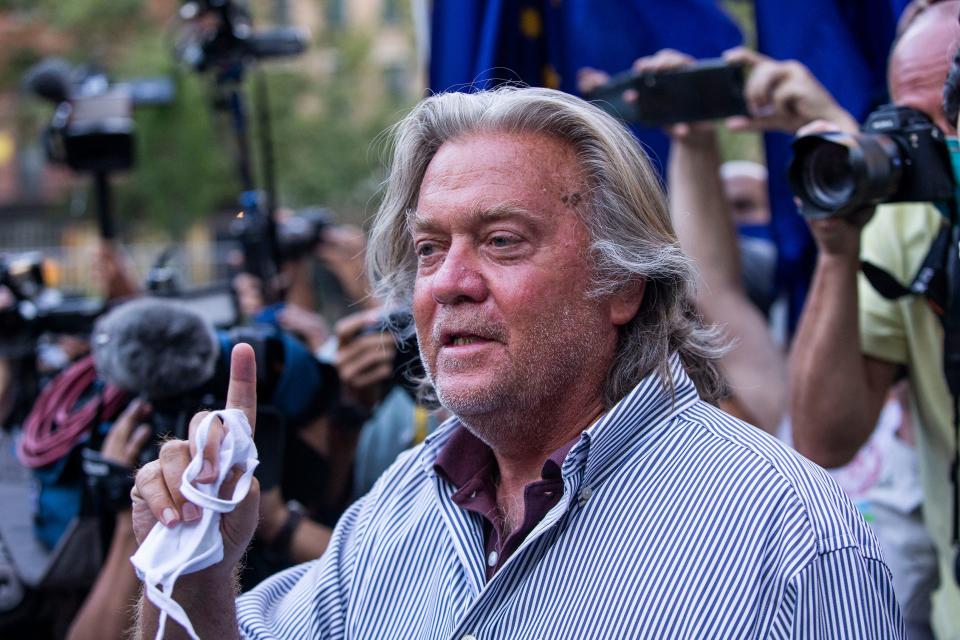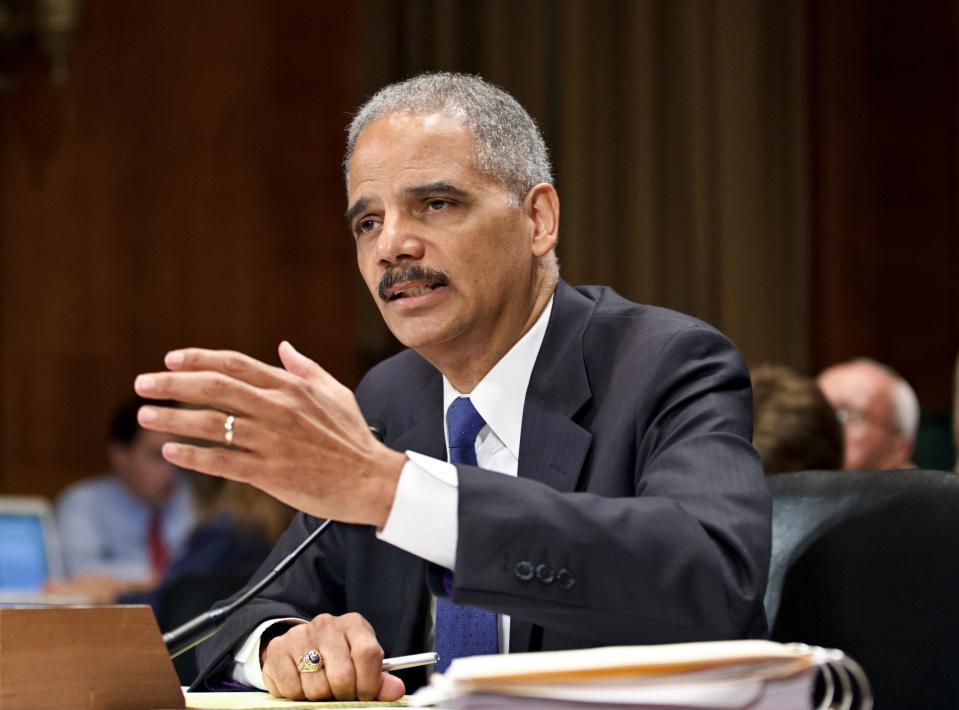Steve Bannon held in contempt of Congress. The last time such charges were successfully prosecuted? Watergate
- Oops!Something went wrong.Please try again later.
In referring Steve Bannon, the adviser to former President Donald Trump, to the Justice Department for contempt of Congress, House Democrats are fighting against history.
Successful criminal prosecution of contempt of Congress charges by the Justice Department have been rare. The last successful prosecution was during the Watergate era, when a judge found G. Gordon Liddy guilty in 1974, according to Reuters and Politico.
In the decades since that case, the Justice Department in many cases has either declined to prosecute or the threat of prosecution has applied enough pressure to force a negotiated resolution.
But legal experts say the case of Bannon, whom the House of Representatives voted to hold in contempt on Thursday for ignoring a subpoena to testify about the Jan. 6 Capitol riot, differs in key ways from others in recent history.

First, Bannon is relying on a claim of executive privilege to justify not showing up for a deposition. But if executive privilege indeed applies to his interactions with Trump – a question some experts say is open in itself – that would not extend to testimony the committee could pursue about his conversations with others.
“Bannon is in a very tight spot and faces significant exposure to criminal prosecution, especially compared to past cases,” said Ryan Goodman, a law professor at New York University.
Bannon’s case also will be examined by a Justice Department led by an attorney general from the same party that controls Congress. That often hasn’t been the case when the House has referred contempt cases before. (Both parties regard Merrick Garland as a moderate.)
AG: Garland vows to apply 'facts and the law' to Steve Bannon case
Justice Department posture
The Justice Department already has balked at the notion that politics would factor into its decision to prosecute. Now that the House passed a resolution of contempt, it is referred to the department for a decision on whether to prosecute.
After President Joe Biden said last week that he believed those who defied the committee’s subpoenas should be prosecuted, the department issued a statement saying it would make an independent decision.
On Thursday, Attorney General Merrick Garland told the House Judiciary Committee that his department would “apply the facts and law and make a decision consistent with the principles of prosecution.”
Stan Brand, the former House counsel who helped build a 1983 case of criminal contempt of Congress, said political alignment between Congress and the White House matters little in the decision to prosecute those cases.
Others, though, suggested it could be a factor.
“I think in a situation like this Mr. Bannon would have to contemplate that he’s actually going to get prosecuted by the Department of Justice,” said W. Neil Eggleston, White House counsel in the Obama administration and lecturer at Harvard Law School.
In past cases, the department has declined to prosecute when different parties controlled the executive and legislative branches, most notably in the cases of attorneys general whom Congress cited.
In 2012, Republicans voted to hold Attorney General Eric Holder in contempt over the Obama administration’s refusal to turn over documents on Operation Fast and Furious, a botched investigation that unraveled after illegally obtained weapons were found at the scene of a fatal Border Patrol agent shooting.

On the same day the case was referred to the Justice Department, it notified the House it would not prosecute.
House Democrats voted in 2019 to hold former Attorney General William Barr in contempt after the Trump administration refused to supply lawmakers with an unredacted copy of special counsel Robert Mueller’s report into alleged Russian interference in the 2016 presidential election. Mueller was appointed by then-Deputy Attorney General Rod Rosenstein in 2017 to oversee an investigation into the matter.
Then, later that year, the Justice Department cited the “long-standing position” that it would not prosecute officials who withhold information when the president asserts executive privilege after Barr and Commerce Secretary William Ross were referred for contempt.

The two Trump administration officials had defied subpoenas seeking additional information about the administration’s effort to include a question about citizenship on the 2020 Census.
Those cases point to a standard adopted during the Reagan administration that the Justice Department will not prosecute executive branch officials who invoke executive privilege at the president’s request.
In 2008, House Democrats voted to hold former White House counsel Harriet Miers and chief of staff Josh Bolten in contempt after the White House – under President George W. Bush – directed them not to hand over subpoenaed documents related to a congressional investigation into the firing of several U.S. attorneys. The case was not settled until Congress was granted access to some of the documents Miers was allowed to submit in sworn testimony under the Obama administration.

“Bannon's case is special because he does not have the backing of the executive branch, whereas others in recent history have not only had the full backing of the executive branch but were also government officials at the time,” Goodman said. “In other words, it was a clash between the two political branches, and the Justice Department was naturally on the executive's side.”
Bannon didn't work for Trump at the time
Goodman and Eggleston agreed that Bannon’s position as an outsider who was not working at the White House on Jan. 6 when rioters stormed the Capitol is significant.
That he was not an executive branch official at the time, Eggleston said, makes it less likely that their talks would have been considered the sorts of official communications covered under executive privilege.
But, Brand said “there’s nothing in the Constitution that says the president's advisers have to be on the government payroll.”
In court, the question of Bannon’s affiliation might not matter at all, though, Eggleston said, because the communication related to the rally Trump held near the Capitol would not be privileged, he said.
“President Trump was not wearing his president hat when he was organizing this rally or even when he was railing against the stolen election,” Eggleston said. “He has his campaign hat on when he’s doing that.”
Bannon also chose not to show up at all for his deposition, citing privilege that would apply only to some communications with Trump. It would not cover his interactions with others.
“Executive privilege, at best, would allow him to refuse to answer specific questions,” Goodman said. “It does not allow him to refuse to come before Congress.”
For example, the privilege would not apply if the committee asked Bannon about interactions with organizers who marshaled people to the rally and the riot that followed, legal experts said.
Rita Lavelle case
Asked to compare Bannon’s situation to a previous case of criminal contempt, experts pointed to that of Rita Lavelle, the former Environmental Protection Agency official whom Congress cited in 1983 when she refused to testify about her management of a hazardous waste cleanup fund.
Lavelle already had been fired by President Ronald Reagan, and the House unanimously referred her for contempt of Congress. The Justice Department later indicted Lavelle.
But when the case went to court, a jury found Lavelle not guilty.
Brand worked on that case alongside the U.S. attorney’s office as House counsel in 1983. At the time, he said, prosecutors thought they had proven “a knowing and willful refusal without any excuse.” But The Washington Post reported after the trial that it took a jury less than two hours to acquit her.
“What’s happened in the 40 years since, all the saber-rattling that Congress makes when they bring these cases or threaten to bring these cases is driven by a desire to get people to comply,” Brand said.
Contributing: Chelsey Cox
This article originally appeared on USA TODAY: Steve Bannon contempt of Congress case stands out historically

